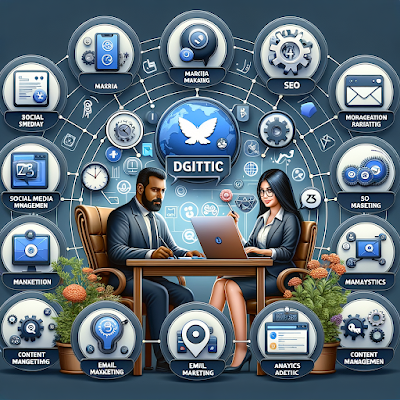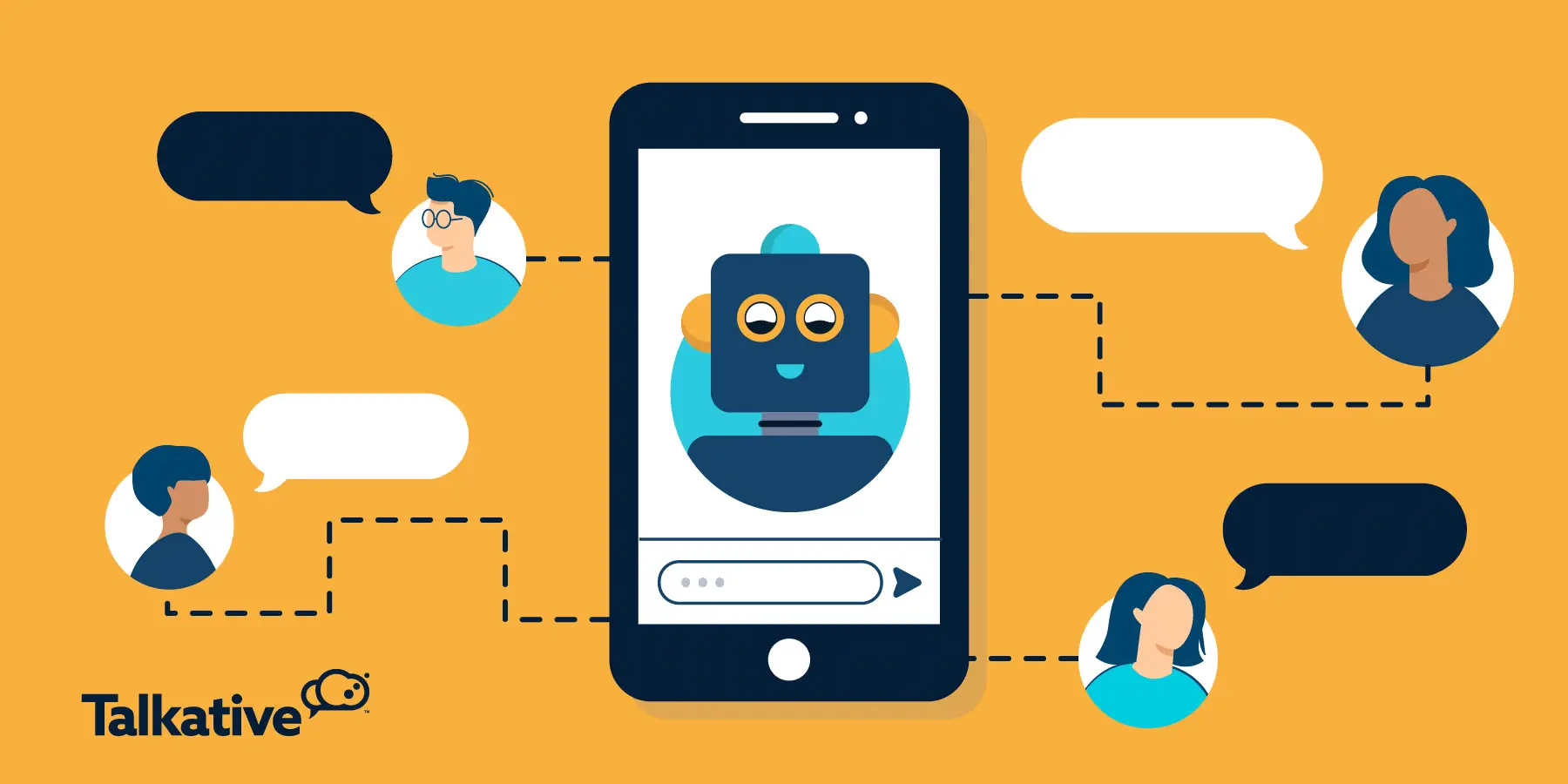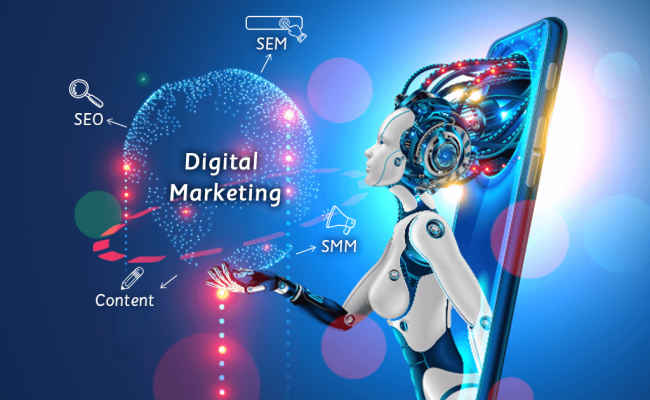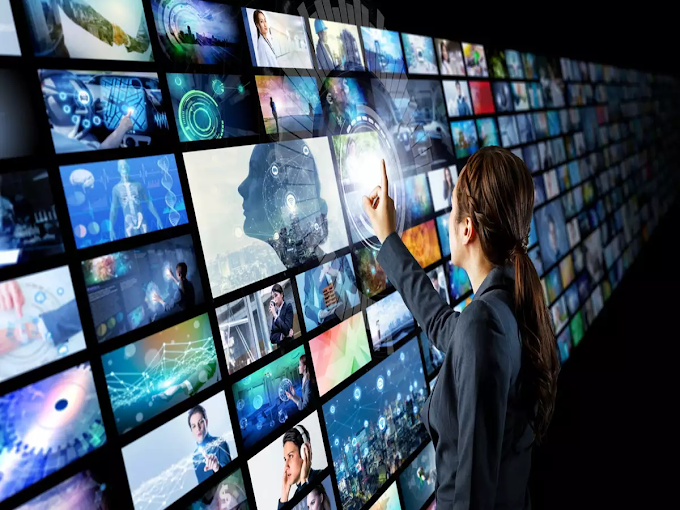AI in Digital Marketing: Trends & Strategies
Did you know that artificial intelligence (AI) is revolutionizing the world of digital marketing in India? With its ability to analyze vast amounts of data and make intelligent predictions, AI is transforming marketing strategies and helping businesses gain a competitive edge in the digital landscape.
In this article, we will explore the latest trends and strategies in AI-driven digital marketing. From machine learning for online advertising to AI-powered content marketing, we will uncover how businesses in India are leveraging AI to optimize their marketing efforts and drive business growth. Let's dive in and discover the transformative power of AI in reshaping India's digital marketing landscape.
Key Takeaways:
- AI is revolutionizing digital marketing in India, transforming marketing strategies and optimizing campaign performance.
- Machine learning enhances online advertising by optimizing ad targeting and automating various aspects of digital marketing.
- AI-powered content marketing improves search engine optimization, generates personalized content, and analyzes data to enhance content strategies.
- Predictive analytics in digital campaigns enables businesses to identify customer behavior trends and optimize marketing strategies accordingly.
- Chatbots in social media marketing engage with customers, provide personalized assistance, and streamline social media interactions.
Machine Learning for Online Advertising
Machine learning, an application of artificial intelligence (AI), is revolutionizing online advertising and shaping the future of digital marketing. By harnessing the power of AI-powered algorithms, businesses can optimize their ad targeting, enhance campaign performance, and automate various aspects of their digital marketing efforts.
One of the key benefits of machine learning in online advertising is its ability to optimize ad targeting. AI algorithms can analyze vast amounts of data, including user demographics, interests, and browsing behavior, to identify the most relevant audience for a particular ad campaign. This targeted approach ensures that ads are shown to the right people at the right time, significantly increasing the chances of conversion.
Moreover, machine learning can improve campaign performance by continuously analyzing and adapting to real-time data. AI algorithms can monitor the performance of ad campaigns, track key metrics such as click-through rates and conversions, and make data-driven adjustments to optimize campaign effectiveness. This iterative process allows advertisers to constantly refine their strategies and achieve better ROI.
In addition to targeting and performance optimization, machine learning also enables automation in various aspects of digital marketing. By automating tasks such as ad bidding, content creation, and campaign management, businesses can save time, reduce human error, and focus on more strategic activities. This digital marketing automation not only improves efficiency but also allows advertisers to scale their operations and reach a larger audience.
In summary, machine learning has become an invaluable tool for online advertising and digital marketing automation. By leveraging AI-powered algorithms, businesses can optimize ad targeting, improve campaign performance, and automate various tasks, leading to increased efficiency and better results. As AI continues to advance, it is expected to play an even more significant role in shaping the future of digital marketing in India and beyond.
AI-Powered Content Marketing
AI has revolutionized the field of content marketing, allowing marketers to leverage the power of cognitive computing to create impactful strategies. By harnessing AI capabilities, businesses can enhance search engine optimization (SEO), personalize content, and analyze data for improved performance.
Cognitive computing in SEO enables marketers to gain valuable insights into consumer behavior, preferences, and trends. With AI algorithms analyzing vast amounts of data, businesses can identify keywords and topics that resonate with their target audience, leading to more effective content creation and optimization.
"AI-powered content marketing empowers businesses to deliver relevant and personalized experiences to their customers, creating stronger connections and driving engagement."
One of the key advantages of AI-powered content marketing is the ability to generate personalized content. With the assistance of AI, marketers can create customized experiences for individual users, tailoring content based on their preferences, demographics, and past interactions. This level of personalization not only enhances user experience but also boosts customer loyalty and conversion rates.
Additionally, AI-driven analytics provide marketers with valuable insights into the performance of their content strategies. By utilizing cognitive computing, businesses can analyze data on user engagement, click-through rates, and conversions to optimize their content production and distribution efforts. These insights enable marketers to refine their strategies, maximize ROI, and achieve their marketing objectives.
The Power of AI-Powered Content Marketing
By integrating AI into content marketing strategies, businesses can achieve significant advantages. Here are some of the benefits:
- Improved search engine visibility through enhanced SEO techniques
- In-depth customer insights and behavioral patterns for targeted content creation
- Personalized content delivery to drive customer engagement and conversions
- Data-driven decision making for content optimization and strategy refinement
Table: AI-powered Content Marketing Benefits
| Benefits | Description |
|---|---|
| Improved Search Engine Visibility | Utilize AI-powered SEO techniques to enhance website ranking and visibility in search engine results. |
| In-depth Customer Insights | Gain valuable data-driven insights into customer behavior, interests, and preferences for targeted content creation. |
| Personalized Content Delivery | Create customized content tailored to individual users, delivering personalized experiences and boosting engagement. |
| Data-Driven Decision Making | Utilize AI analytics to analyze data and make informed decisions to optimize content performance and strategy. |
Predictive Analytics in Digital Campaigns
In today's digital landscape, data plays a crucial role in informing marketing decisions and strategies. With the advent of predictive analytics, businesses can leverage advanced algorithms to gain insights into customer behavior, predict future user actions, and optimize their digital campaigns for maximum impact.
Predictive analytics in digital campaigns involves the use of AI-driven algorithms to analyze large datasets, identify patterns, and make data-driven predictions. By understanding customer preferences, purchase history, and online behavior, businesses can tailor their marketing strategies to effectively target the right audience at the right time.
Benefits of Predictive Analytics in Digital Campaigns
By harnessing the power of predictive analytics, businesses can achieve the following key benefits:
- Improved targeting: Predictive analytics enables businesses to identify their most valuable customers and target them with personalized messaging. This results in higher conversion rates and better ROI for digital campaigns.
- Optimized marketing strategies: With insights gained from predictive analytics, businesses can optimize their marketing strategies by identifying the best channels, messaging, and timing for their campaigns. This leads to more effective and efficient marketing efforts.
- Reduced customer churn: By analyzing customer behavior patterns, predictive analytics can help businesses identify at-risk customers and implement proactive measures to retain them. This reduces customer churn and increases long-term customer value.
- Improved customer experience: Personalized messaging and targeted offers based on predictive analytics can enhance the customer experience. By delivering relevant content and recommendations, businesses can increase customer satisfaction and loyalty.
Real-world Example: Predictive Analytics in E-commerce
"Using predictive analytics, e-commerce giant Amazon has revolutionized its personalized recommendation system. By analyzing customer data such as browsing history, purchase behavior, and product reviews, Amazon can accurately predict customer preferences and make personalized product recommendations. This not only enhances the customer experience but also drives increased sales and customer loyalty."
The Future of Predictive Analytics in Digital Campaigns
As technology continues to evolve, the potential applications of predictive analytics in digital campaigns are vast. With advancements in machine learning and AI, businesses can expect even more accurate predictions and insights, leading to highly targeted and successful digital marketing efforts.
Predictive Analytics in Action
| Industry | Use Case |
|---|---|
| Retail | Predicting customer churn and implementing targeted retention strategies. |
| Travel | Forecasting demand for certain destinations and optimizing pricing strategies. |
| Finance | Identifying potential fraudulent activities and preventing financial losses. |
| Telecommunications | Forecasting network traffic to optimize capacity and improve service quality. |
Chatbots in Social Media Marketing
With the growing influence of social media in India, businesses are constantly seeking innovative ways to engage with their audience. One such innovation is the rise of chatbots in social media marketing. These AI-powered virtual assistants have revolutionized the way brands interact with customers, providing personalized assistance and streamlining social media interactions.
Chatbots in social media marketing offer a range of benefits for businesses. Firstly, they enable 24/7 customer support, ensuring that queries and concerns are addressed promptly. This improves customer satisfaction and enhances brand loyalty. Additionally, chatbots can handle multiple customer interactions simultaneously, significantly reducing response times and increasing efficiency.
When it comes to social media marketing, personalization is key. Chatbots have the ability to analyze customer data and create tailored experiences, ensuring that users receive relevant and targeted content. By understanding user preferences and behaviors, chatbots can deliver more accurate product recommendations and personalized offers, driving higher conversion rates.
Furthermore, chatbots excel at automating repetitive tasks such as answering frequently asked questions, providing shipping updates, and processing orders. By taking on these mundane tasks, businesses can allocate their resources to more complex and strategic initiatives.
"Chatbots have transformed the way we engage with customers on social media platforms. They not only provide instant support but also serve as a valuable source of customer insights and market data." - Social Media Manager, XYZ Brands
The integration of chatbots in social media marketing has proven to be a game-changer for businesses. It enables brands to deliver exceptional customer experiences, drive engagement, and maximize their reach. By leveraging AI technology, companies can harness the power of chatbots to unlock new opportunities in the dynamic landscape of social media marketing.
Virtual Assistants for Email Marketing
In today's digital landscape, email marketing remains an essential strategy for businesses to engage with their audience and drive conversions. However, managing and optimizing email campaigns can be a time-consuming task. This is where virtual assistants powered by artificial intelligence (AI) come into play. These intelligent assistants offer advanced automation and personalization capabilities that can significantly enhance the performance of email marketing efforts.
The Role of Virtual Assistants in Email Marketing
Virtual assistants are AI-powered tools designed to streamline and simplify various tasks associated with email marketing. These assistants can automatically perform tasks such as sending personalized emails, segmenting email lists, analyzing campaign performance, and even suggesting improvements to optimize email content.
By leveraging virtual assistants for email marketing, businesses can benefit from:
- Automation: Virtual assistants can automate repetitive tasks, such as scheduling and sending emails, saving valuable time and resources for marketers.
- Personalization: AI-powered assistants can analyze customer data, such as preferences and behavior, to deliver highly personalized email content, enhancing engagement and conversion rates.
- Efficiency: With the ability to analyze data and provide actionable insights, virtual assistants can help marketers make informed decisions, optimize campaigns, and achieve better results.
- Improved Deliverability: Virtual assistants can monitor email deliverability metrics and provide recommendations to ensure that emails reach the recipients' inboxes, maximizing the effectiveness of email marketing efforts.
Realizing the Benefits with AI-powered Virtual Assistants
AI-powered virtual assistants have the potential to revolutionize email marketing strategies, offering unprecedented efficiency and personalization. By leveraging the capabilities of virtual assistants, businesses can unlock the following benefits:
- Time Savings: Virtual assistants automate time-consuming tasks, allowing marketers to focus on strategy and creative aspects of email marketing.
- Increased Engagement: Personalized email content delivered by AI-powered assistants can significantly enhance customer engagement and encourage higher open and click-through rates.
- Better ROI: By automating processes and optimizing campaign performance, virtual assistants can improve the return on investment (ROI) of email marketing efforts.
"Virtual assistants for email marketing empower businesses to harness the full potential of AI and automation, enabling them to deliver highly targeted and personalized email campaigns that drive results." - Marketing Expert
| Benefits of Virtual Assistants for Email Marketing | Impact on Email Marketing Efforts |
|---|---|
| Automation | Time savings and increased efficiency |
| Personalization | Higher engagement and conversion rates |
| Efficiency | Informed decision-making and campaign optimization |
| Improved Deliverability | Maximized effectiveness of email marketing |
By leveraging AI-powered virtual assistants, businesses can supercharge their email marketing strategies, delivering targeted and personalized campaigns that resonate with their audience and drive tangible results.
Cognitive Computing in Advertising Strategy
The integration of cognitive computing in advertising strategies has revolutionized the way brands connect with their target audience. By leveraging the power of AI, businesses can now analyze consumer insights, deliver targeted ads, and optimize advertising campaigns, resulting in more effective and impactful marketing efforts.
Cognitive computing utilizes advanced algorithms and machine learning techniques to understand human language, emotions, and behavior. This enables advertisers to craft personalized and engaging advertisements that resonate with their target audience on a deeper level. By analyzing vast amounts of data, cognitive computing can uncover valuable insights into consumer preferences, interests, and buying behaviors, allowing advertisers to tailor their campaigns for maximum impact.
One of the key benefits of cognitive computing in advertising strategy is its ability to deliver targeted ads to specific audience segments. By using AI algorithms to analyze consumer data, businesses can create highly customized ad campaigns that are relevant to each individual's interests and preferences. This level of personalization not only improves ad performance but also increases customer engagement and brand loyalty.
Cognitive computing also plays a crucial role in optimizing advertising campaigns. By continuously analyzing real-time data and consumer feedback, AI algorithms can make data-driven decisions to improve campaign performance. This includes optimizing ad placement, adjusting targeting parameters, and identifying the most effective messaging and creative elements. With cognitive computing, advertisers can make real-time adjustments to their campaigns, ensuring that they are always delivering the right message to the right audience at the right time.
In conclusion, cognitive computing is transforming advertising strategy by enabling businesses to better understand and connect with their target audience. By leveraging the power of AI, brands can analyze consumer insights, deliver targeted ads, and optimize advertising campaigns for maximum impact. In an increasingly competitive digital landscape, cognitive computing is becoming a game-changer for advertisers seeking to stay ahead of the curve and deliver compelling, personalized experiences to their customers.
The Future of AI in Digital Marketing
The future of AI in digital marketing holds immense promise as emerging technologies continue to shape the Indian digital landscape. AI has already made significant strides in revolutionizing marketing strategies, and its potential for growth and innovation is undeniable. However, with great opportunities come potential challenges that marketers need to be prepared for.
Evolving Role of AI in Digital Marketing
Artificial intelligence is rapidly transforming the way businesses interact with consumers. As AI algorithms become smarter and more sophisticated, they offer marketers invaluable insights into consumer behavior, enabling them to create personalized and highly targeted campaigns. AI-powered tools and platforms are revolutionizing customer segmentation, lead generation, and conversion rates. By leveraging AI, businesses can optimize their marketing efforts and effectively engage with their target audience.
Emerging Technologies in AI and Digital Marketing
The future of AI in digital marketing will witness the rise of cutting-edge technologies that will redefine the industry. For instance, natural language processing (NLP) will enhance chatbot interactions, enabling businesses to provide seamless customer experiences across various touchpoints. Virtual reality and augmented reality will revolutionize product visualization, enabling customers to engage with products in immersive and interactive ways. Voice search and voice-activated devices will shape the future of SEO, creating new opportunities for brands to engage with users.
Challenges and Considerations
While the future of AI in digital marketing is bright, challenges such as data privacy, ethical considerations, and algorithm bias must be addressed. Marketers need to understand the importance of responsible AI usage and ensure transparency in data collection and usage. They must also be mindful of potential biases in AI algorithms to ensure fair and unbiased marketing practices. Additionally, keeping up with the rapid advancements in AI technology and upskilling the workforce will be crucial for organizations to stay competitive.
The Way Forward
The future of AI in digital marketing holds immense potential for businesses in India. By harnessing the power of AI-powered tools and technology, marketers can gain a competitive edge, drive business growth, and deliver exceptional customer experiences. However, to truly unlock the benefits, businesses must embrace AI with a strategic mindset, keeping ethical considerations and potential challenges in mind. By doing so, they can navigate the evolving digital landscape and position themselves for long-term success.
| Advantages of AI in Digital Marketing | Challenges of AI in Digital Marketing |
|---|---|
| 1. Personalized and highly targeted campaigns | 1. Data privacy concerns |
| 2. Improved customer segmentation and lead generation | 2. Ethical considerations |
| 3. Enhanced user experiences through AI-powered chatbots | 3. Algorithm bias |
| 4. Revolutionized product visualization with virtual reality and augmented reality | 4. Rapid advancements in AI technology |
| 5. New opportunities for engagement through voice search | 5. Upskilling the workforce |
Leveraging AI for Business Growth
In today's highly competitive business landscape, leveraging AI has become crucial for driving growth and staying ahead of the curve. By incorporating artificial intelligence into marketing plans, businesses can unlock a world of opportunities to enhance customer experience, streamline operations, and gain a competitive edge.
Strategies for Incorporating AI
Integrating AI into marketing strategies requires careful planning and implementation. Here are some effective strategies for leveraging AI to drive business growth:
- AI-Enabled Customer Segmentation: Analyze customer data using AI algorithms to identify specific segments and personalize marketing efforts accordingly. This targeted approach can significantly improve customer engagement and conversion rates.
- Automated Personalization: AI-powered algorithms can analyze customer behavior and preferences to deliver personalized experiences. By leveraging AI, businesses can create hyper-personalized content, recommendations, and offers to enhance customer satisfaction and loyalty.
- Predictive Analytics: Utilize AI-driven predictive analytics to forecast customer behavior, identify trends, and optimize marketing campaigns. By understanding customer preferences and trends in advance, businesses can make informed decisions and allocate resources effectively.
- AI-Powered Chatbots: Implement AI-powered chatbots to automate customer interactions, provide instant assistance, and offer personalized recommendations. Chatbots can handle routine inquiries, freeing up resources for more complex tasks and improving overall customer satisfaction.
Improving Customer Experience
Leveraging AI can significantly enhance the customer experience, leading to increased satisfaction and loyalty. By utilizing AI-powered technologies, businesses can:
- Deliver personalized recommendations
- Offer 24/7 customer support through chatbots
- Automate customer onboarding and support processes
- Analyze customer feedback sentiment for actionable insights
These AI-driven initiatives can help businesses create seamless and personalized customer experiences, resulting in improved brand perception and customer retention.
Gaining a Competitive Edge
By embracing AI, businesses can gain a competitive edge in the market. AI-powered technologies can:
- Automate repetitive tasks, freeing employees to focus on more strategic initiatives
- Analyze vast amounts of data quickly and accurately
- Identify trends and patterns that human analysis may miss
- Optimize marketing campaigns for better results and higher ROI
By harnessing the power of AI, businesses can make data-driven decisions, react promptly to market trends, and position themselves as leaders in their industries.
| Benefits of Leveraging AI for Business Growth | Challenges of Implementing AI in Business |
|---|---|
|
|
Despite the challenges, the benefits of leveraging AI for business growth far outweigh the drawbacks. Embracing AI technology can help businesses unlock their full potential, achieve sustainable growth, and adapt to the ever-evolving digital landscape.
Conclusion
In conclusion, this article has highlighted the various trends, strategies, and applications of AI in digital marketing. The adoption of artificial intelligence in marketing strategies has transformed India's digital landscape, revolutionizing how businesses connect with their audience and deliver personalized experiences.
From machine learning optimizing online advertising to AI-powered content marketing enhancing search engine optimization, cognitive computing analyzing consumer insights, and predictive analytics optimizing digital campaigns, AI has proven to be an invaluable asset in driving marketing success.
The rise of chatbots in social media marketing and virtual assistants in email marketing has provided businesses with efficient and effective ways to engage with their target market, enhance customer service, and streamline their marketing efforts. Additionally, the integration of cognitive computing in advertising strategies has revolutionized ad targeting, delivering personalized and relevant ads to consumers.
As the future of digital marketing unfolds, embracing AI will be crucial for businesses to stay ahead in the competitive market. By leveraging AI for business growth, companies can not only improve their marketing strategies but also enhance customer experience, gain a competitive edge, and drive overall success. It is clear that AI is reshaping the digital landscape of India and will continue to play a vital role in the future of marketing.
FAQ
What is AI in digital marketing?
AI in digital marketing refers to the use of artificial intelligence technologies and algorithms to enhance marketing strategies and optimize various aspects of digital campaigns.
How does machine learning benefit online advertising?
Machine learning in online advertising enables AI-powered algorithms to analyze data patterns, optimize ad targeting, and automate aspects of digital marketing, leading to improved campaign performance and efficiency.
What is the role of AI in content marketing?
AI-powered content marketing utilizes cognitive computing to enhance search engine optimization, generate personalized content, and analyze data to improve content strategies and audience engagement.
What are predictive analytics in digital campaigns?
Predictive analytics in digital campaigns involves using AI-driven algorithms to analyze data patterns, identify customer behavior trends, and optimize marketing strategies based on predictive insights.
How do chatbots impact social media marketing?
Chatbots powered by AI have revolutionized social media marketing by engaging with customers, providing personalized assistance, and streamlining social media interactions for businesses.
How can virtual assistants optimize email marketing?
AI-powered virtual assistants in email marketing automate email campaigns, personalize messaging, and improve overall email performance, enhancing customer engagement and generating better results.
What is the importance of cognitive computing in advertising strategy?
Cognitive computing in advertising strategy enables AI algorithms to analyze consumer insights, deliver targeted ads, and optimize advertising campaigns for optimal audience engagement and conversion rates.
What does the future hold for AI in digital marketing?
The future of AI in digital marketing involves the integration of emerging technologies, potential challenges, and an evolving role of AI in reshaping the Indian digital landscape, presenting new opportunities and possibilities.
How can businesses leverage AI for growth?
Businesses can leverage AI to drive growth by incorporating AI into marketing plans, improving customer experience through personalized interactions, and gaining a competitive edge through AI-driven strategies and insights.
What are the key takeaways from AI in digital marketing?
The article highlights various trends, strategies, and applications of AI in digital marketing, showcasing its transformative power in reshaping India's digital landscape and emphasizing the importance of embracing AI to stay ahead in the competitive market.



.jpg)













